How 27 properties in a Troy neighborhood ended up in a shaky situation -- and the complicated path back to solid footing
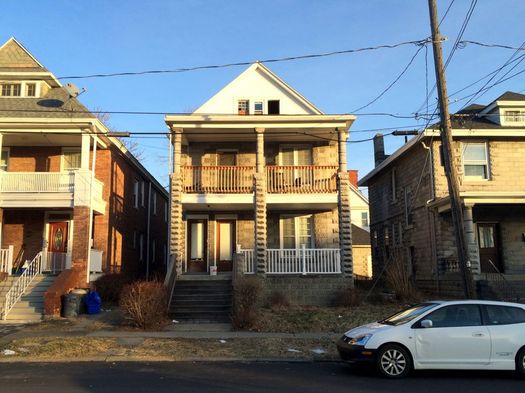
One of the properties on Fourteenth Street.
On January 12, 2012, Rensselaer Polytechnic Institute in Troy issued an emergency notification, advising students who rented off-campus housing from a company called Campus Habitat "that the continuation of their ability to reside in that residence may be in immediate jeopardy." Campus Habitat had not paid its mortgage, utility bills, or real-estate taxes for several months, and was "involved in a large similar foreclosure lawsuit" near a school in Illinois, the alert advised.
Some 200 students escrowed or withheld rent; many sought new housing. And the memo was prophetic: Within weeks, the student-rental company's largest area lender, SEFCU, posted foreclosure notices on the doors of 27 homes.
Today students still occupy most of these homes, but it wasn't a straight path to this point. Sited in teetering neighborhoods in a city never far from "fiscal chaos," this critical assemblage of student housing, over the past half decade, has entailed a tangle of litigation, a protracted sale period, a surprise intervention, and millions of dollars in public and private investment -- all to overcome the actions of a landlord who profited at the community's expense and left a sizable chunk of the neighborhood untended.
"Oh, my God -- they were awful"
Despite the memo's stated urgency that January in 2012, no one had to move out, at least not immediately -- the utility bills were paid that month, and soon after, a state Supreme Court appointed a receiver to collect rents and manage the buildings -- but concern about the properties' ownership was warranted nonetheless. In a separate case, Campus Habitat's founder, Maximus Yaney -- who once claimed to have attended RPI (the school would not confirm his enrollment) -- would later plead guilty to mortgage fraud in 2015 in the land of Lincoln, pay $7.7 million in restitution to lenders, and be sentenced to prison. (Yaney, who was released in October, could not be reached for comment.)
Toward the end of 2012, SEFCU acquired full title to the properties and started searching for a buyer. The modest homes were dilapidated, "cut up" into too many rooms and subjected to years of "deferred maintenance," according to Hillside-Beman Park neighborhood meeting minutes. "The introduction of this many units of student housing has deteriorated the quality of life for everyone," the neighborhood group advised then-Mayor Lou Rosamilia.
"Oh, my God -- they were awful," said Anita Taraqji Ogali, 60, who lives next door to one of the rental properties in Hillside, when asked about this era and Campus Habitat. She spoke of property damage and late-night roistering, which once cost her sleep before a job interview. "I called the president of RPI," she said. "I mean, I got the secretary. I just ranted and raved."
In an email, RPI alumnus Joe Fama, who for decades led the Troy Architectural Program (known as TAP), a nonprofit community design center, called Campus Habitat "the most inventive and predatory developers I ever encountered at the neighborhood level." Weaknesses in the municipal zoning ordinance, Fama explained, allowed the company to convert multi-family homes to single-family homes while increasing the total number of bedrooms by sacrificing surplus kitchens, living rooms, and dining rooms. This practice led the Troy city council to impose a series of "mini-dorm" moratoriums, the most recent of which lapsed in September 2015.
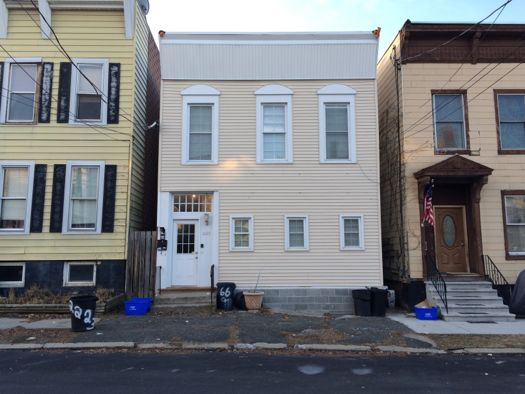
One of the properties on Fourteenth Street.
On multiple occasions, RPI and Campus Habitat representatives discussed the prospect of the school purchasing some of the rental properties, though such talks "were casual in nature and no meeting of the minds ever took place," RPI stated in one court filing.
Residents entreated SEFCU not to sell the properties in one block, "so that local investors will have an opportunity to make offers," meeting minutes report. But SEFCU, according to Peter Sciocchetti of Coldwell Banker Commercial, the realtor hired to market the properties, did not want buyers to "cherry-pick" the best ones, leaving the bank stuck with the duds.
"I think the owner's thought was that the best value we could get from them was as a whole," Sciocchetti told me over the phone. The homes languished on the market for over a year. (SEFCU did not respond to multiple emails regarding this story.)
"It was a big albatross," city council member Bob Doherty, whose district includes some of the properties, told me over the phone.
An unexpected entrant
Who wanted 27 derelict houses?
One prominent businessman: Joseph Nicolla, an RPI graduate and president of Columbia Development, which had already undertaken about $100 million worth of lauded projects in the city, and had secured an array of deals with the university.
"Over the past decade, [RPI] has entered into seven lease agreements with Columbia Development subsidiaries to provide student housing, staff offices, storage facilities, and lab space," RPI spokesperson Richie C. Hunter wrote in response to a number of questions about the school's relationship with the developer. "Each lease was entered into following the standard processes and controls used by Rensselaer for business arrangements of this type. The lease terms are customary for real estate of this type, and for the area."
Columbia bought the foreclosed parcels from SEFCU for $3.21 million in November 2014.
"Which surprised me," Doherty said of the firm's interest in his roughly half-working-class, half-student-rental neighborhood, "because I know Columbia Development from hospital work, and their projects are huge projects, not two- and three-family houses."
City councilman Dean Bodnar, whose district includes the majority of the properties, reacted similarly: "I was impressed that a guy of Nicolla's...experience [and] track record was willing to take this on because, you gotta understand, I'd been through...roughly four years of negative experience with the owner and the aftermath," he told me over the phone. The buildings' vacancy threatened property values and neighborhood safety. For him and others, the intervention of an accomplished developer came as a relief.
"I'm sure [Nicolla] felt a certain loyalty to RPI," Bodnar said, speculating on the businessman's motive, "and I guess that when he was a student, from what I've heard, he used to live up in this area, too. So, you know, maybe he had that tugging at him a little bit."
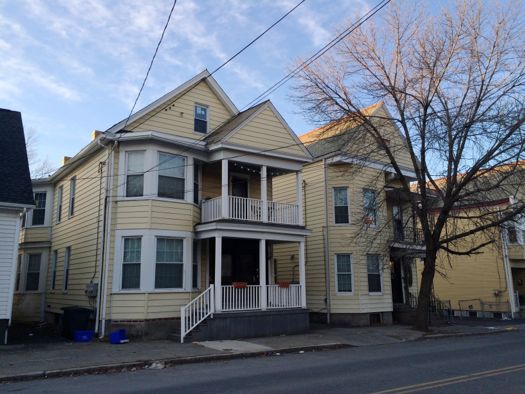
Two of the properties on Fifteenth Street.
Prior to the purchase, Columbia representatives appeared twice before the Troy Industrial Development Authority, a public-benefit corporation governed by a mayor-appointed board, to ask for tax breaks to acquire and rehab the run-down properties. According to minutes from the initial meeting that summer, one of the project's goals was "to de-densify the number of [bedrooms] by 10% bringing the number from 220 to 200." The developer also said it was "setting up a $50,000 homeownership program possibly to keep the people here as homeowners to help the neighborhood." (In 2012, area residents had asked Mayor Rosamilia to tell SEFCU that "we would like some buildings paired with grant money and/or incentives to encourage homeownership.")
In October 2014, TIDA unanimously voted to award the developer a financial assistance package worth an estimated $1 million in mortgage recording tax, sales and use tax, and property tax exemptions over a 20-year period. According to the state Authorities Budget Office, which monitors IDAs, in 2015 Columbia subsidiaries received $381,636.65 in net exemptions through TIDA. The developer's five TIDA-approved projects -- the Chasan building, Proctor's Theater, the Hilton Garden Inn, 16 First Street (and two nearby buildings), and the Hillside-Beman Park properties -- all are subject to tax breaks through at least 2029.
"You know, if you have one person doing a big project, you're vulnerable to it"
In September of 2016, Joseph Nicolla was charged with one count of felony bid-rigging, related to a now-defunct student dorm proposal near SUNY Polytechnic.
According to the state Attorney General's criminal complaint, the alleged scheme went like this: In March 2015, Fuller Road Management Corporation, SUNY Poly's not-for-profit development arm, requested proposals for a student housing project adjacent to the Albany campus. About a year before that request, Columbia Development began purchasing nearby properties on Loughlin Street. A subpoena unearthed a site-drawing dated August 15, 2014 -- incidentally, the same day Columbia appeared before TIDA to ask for tax breaks for the Hillside-Beman Park properties -- that depicted three dormitories and a parking lot on the assembled parcels. That fall, according to the complaint, Nicolla and Kaloyeros exchanged emails on the progress of the former's purchase of one parcel and the latter's receipt of "a solicitation from a competing development company interested in SUNY Poly student housing."
In February 2015, Kaloyeros sent an email "effectively notifying" Nicolla of the request for proposals' content about a month before its public release. Only Columbia, in the end, made a formal proposal. An "executive from a major Albany construction company" advised the state attorney general's office that the request for proposals was "geared toward one company" -- Columbia Development.
After media questioned the deal and the state attorney general's office launched an investigation, Fuller Road Management Corporation "withdrew the award to Columbia and reissued" the request for proposals in November 2015. Columbia sold off its parcels near campus.
Nicolla has pled not guilty. (Over the phone, he maintained his innocence, but declined to speak on the record.) Governor Andrew Cuomo has announced that his reelection campaign will "set aside" $11,000 in contributions from the developer, pending the case's outcome.
"You know, if you have one person doing a big project, you're vulnerable to it," city councilman Bob Doherty, who is also a TIDA board member, mused over the phone. "Like, when [Nicolla] got [charged]. My first thought was, 'Oh, shit, what about our project?'" he laughed. "Immediately you start asking questions. You know, our project is minuscule in comparison," he added. "With us, there was no false bidding."
The tax breaks -- and another change of hands
I asked Doherty: "Do you think that the city ought to reconsider the fact that it's giving in excess of a million dollars in financial assistance to this company through this project," in light of the bid-rigging charge against Nicolla?
"When you phrase it in that way, it's misinforming to the public," Doherty replied. "We didn't give him any money. It's money that comes to us that was not coming to us. We were starting from zero...To attract a solution to those 26 vacant and non-paying houses, it was worth the tax break."
He characterized the graduated structure of the payment in lieu of taxes (PILOT) agreement, in which the beneficiary's annual payments to the city steadily approach "full taxes," as a kind of on-ramp to a "heartier tax base."
In separate interviews, councilman Dean Bodnar, also a TIDA board member, and Steven Strichman, the city's commissioner of planning and community development and executive director of TIDA, raised similar defenses of the public authority's support of the Hillside-Beman Park project. Bodnar highlighted the "social value" of the project -- the positive "effect of what well-managed homes, even rentals, [have] on struggling neighborhoods."
"Ideally, would we like to be approving projects to set up...some sort of a manufacturing plant in Troy that's gonna bring 200 jobs here? Oh, gosh, that'd be our dream," Bodnar said, when I mentioned the small number of permanent jobs the project created -- four full-time and six part-time last year, according to Strichman.
But given the variables of the situation, it's hard to envision a better fate for the 27 properties. The Troy Community Land Bank, a public authority with a partly mayor-appointed board, acquires "vacant, under-utilized or tax-delinquent properties that have a profoundly negative [effect] on the surrounding neighborhood," according to its website. The agency, with its mission-driven commitment to neighborhood stability, seems an ideal match for the Hillside-Beman Park conundrum, except it was in its infancy when Columbia bought the homes -- and their cost was more than double the total amount of funding the land bank has received to date.
Nicolla appeared in person before TIDA in February 2016 to offer, in part, a quasi-mea culpa about the Hillside-Beman properties. With his firm headquartered in Albany, juggling all the student rentals wasn't easy -- particularly without a building manager at the diffuse site. Further, Nicolla was unsatisfied, according to minutes, "with how his people managed the properties." Columbia's staff had unspecified problems "working with the students" -- to whom, pursuant to an agreement with RPI, the school confirmed, these properties are solely rented, at about $500 to $600 per bedroom per month.
Nicolla's solution was to bring in a local, emerging developer -- Jeff Buell of Sequence Development in Troy -- to administer the project. The two had formed a partnership, Garnett Housing, which bought the properties from Columbia for $5.49 million that same month. (The difference between that price and the $3.21 million Columbia originally paid SEFCU nearly equals the amount -- $2.6 million -- that Nicolla told TIDA he'd spent rehabbing the buildings. In an email, Jeff Buell declined, as he did when asked by the Albany Business Review in March, to disclose the partnership's ownership percentages.) TIDA voted to transfer the tax breaks to Garnett Housing.
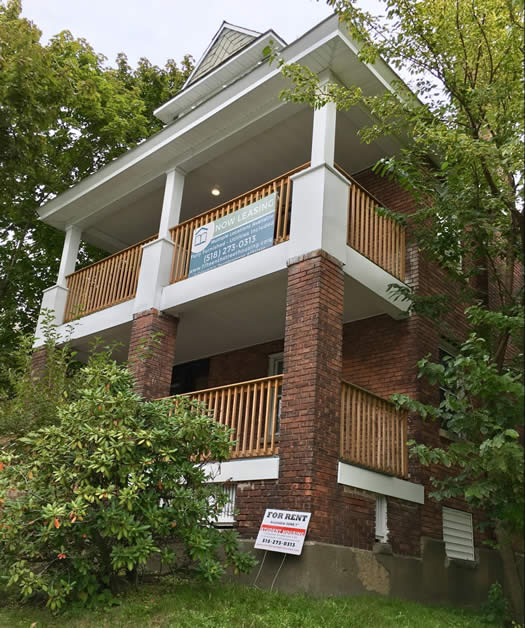
Garnett Housing returned to TIDA this past August. It asked for consent to sell four of its properties, which would then be subject to full taxes. One home was to be sold to Melinda Lawrence, an employee of Fifteenth Street Housing, Garnett Housing's property-management arm, and three were to be sold to Chris Colwell, a past business partner. TIDA authorized the sales.
The four properties were sold the next month. According to county records, Colwell paid $435,000 for his three. Lawrence paid $10. (She did not respond to a request for comment.)
Days after his purchase was recorded at the Rensselaer County clerk's office, Colwell put two of the properties back on the market. "A better investment opportunity presented [itself]," Colwell said of the quick turnaround, in a Facebook message. "I needed to sell them to free up some cash/debt and pursue a more lucrative project." Colwell confirmed that the two homes had since been sold, but did not respond to subsequent questions.
According to deeds recorded at the county clerk's office on December 27, the two houses -- 190 Tenth Street and 156 Ninth Street -- were sold for a total of $265,000 to Oikoi Enterprises LLC, which is owned by Barbara Klap of Kinderhook. Reached by email, Klap said she intends to continue to rent to students.
When asked in an email about Garnett's sale to Lawrence, Jeff Buell explained that the home was "on the verge of becoming a blighted property. Prior to our purchase, Joe was offering it to anyone who wanted it for $1, as it needs a massive amount of time, effort and dollars to rehab." Columbia never renovated it, nor did it ever rent the home to students, Buell told me. "Melinda stepped up to the challenge," he wrote. "I'm proud that someone who works for us is sowing back into the community a solid effort. It isn't an easy decision to risk everything you have." Lawrence plans to move from Albany to renovate the home and live there, according to TIDA minutes.
A fair deal?
The same month, Garnett Housing purchased nine more houses in the same neighborhoods. I wondered if the company would have been able to make such a purchase if it were paying full taxes on the other parcels. Was the PILOT deal fair to smaller-scale landlords?
"Fair question and one I've certainly heard before," Buell replied. "First, we are a smaller scale landlord. I started this company in 2013 with $7,500 and a hope we could find a way to make it work. We've been aggressive in expanding because we believe in the neighborhood (I actually grew up 4 blocks from where I'm sitting and played basketball every day in Beman Park), we believe in RPI, and we believe in Troy. To answer your other question, the recently purchased properties do 'work' because they are taxed at the value for what they are worth, what we paid for them."
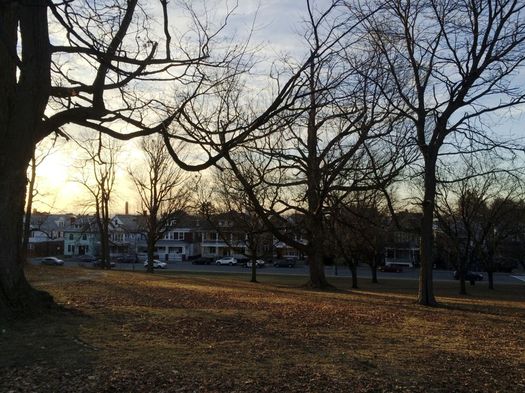
Beman Park
Steven Strichman, TIDA's executive director, had referred me to Buell to answer questions about the homeownership program and the de-densification goal. Buell knew nothing of the former -- its proposal predated his involvement. (note below)
De-densification did occur, though not to the extent initially presented. A letter from Peter Sciocchetti to SEFCU -- dated January 18, 2013, over a year before Columbia's acquisition -- pegs the total number of bedrooms at 216. Buell said his own records show that when Garnett Housing assumed control, there were 211 rentable beds. That suggests a 2.3% reduction in beds during Columbia Development's exclusive tenure. Garnett subsequently removed five more bedrooms before the flurry of September transactions.
De-densification remains "a constant goal of ours," Buell told me. "We are constantly evaluating the living conditions of these buildings."
Buell also offered a full-throated defense of his friend and business partner Joseph Nicolla. The bid-rigging charge against the developer, Buell wrote, was "complete nonsense," and competitors who had furtively raised questions about SUNY Poly's dealings with Columbia were "cowardly and don't deserve the time of day."
What to make of all this
blue = original Campus Habitat properties still part of the group
yellow = properties originally part of the group that have been sold
red = properties since bought by Garnett Housing
Campus Habitat's peculiar malignance makes it hard to find meaning in the saga, though it highlights the risk of having a single company own such a large string of properties in a neighborhood. Conversely, it was another large company that stabilized the situation -- Columbia's substantial investments in the neglected properties, at least in some instances, likely exceeded their market value. In return, the developer exacted subsidies from a cash-strapped city now in budgetary straits. Nicolla and Buell's venture today seems a success: Many of the homes might still be vacant had they not intervened.
If anything, the Hillside-Beman Park neighborhoods deserved recompense or at least an apology from Maximus Yaney when the situation unravelled -- but he fled the country during the foreclosure proceedings, leaving his creditors, the homes, and his neighbors an outcome that, for at least for a lengthy spell, was even worse than if the company had remained solvent.
____
Note from above: An email on 10/30/14 from Bill Dunne, the executive director of TIDA at the time the initial project was approved, to Joseph Nicolla reads: "I wanted to touch bases with you regarding previous conversations about an eventual homeownership (grant) program as part of the Beman Park project. While I personally think it is crucial to the health of the neighborhood, it might fall outside your business model. Regardless, should you have any desire to pursue something as part of, or as an adjunct to your efforts in Beman Park, I'd happily facilitate a conversation with Patrick Madden, Executive Director of TRIP, Inc. TRIP runs a very successful homeownership center and would make an excellent partner in creating opportunities for homeownership." Christine Nealon, current executive director of TRIP, told me she had no record of such a conversation ever transpiring. Now-Mayor Madden's deputy director of public information, John Salka, did not respond to a request for comment.
Luke Stoddard Nathan is a journalist based in Troy. | @lukestdnathan
Say Something!
We'd really like you to take part in the conversation here at All Over Albany. But we do have a few rules here. Don't worry, they're easy. The first: be kind. The second: treat everyone else with the same respect you'd like to see in return. Cool? Great, post away. Comments are moderated so it might take a little while for your comment to show up. Thanks for being patient.
Comments
Flip this property - Troy edition. Where you get more money if you use local government and RPI as the strawman!
... said ace on Jan 9, 2017 at 4:31 PM | link
Very interesting and well-written article about what sounds like a very complicated situation.
... said Ellen on Jan 9, 2017 at 4:34 PM | link
As long as our cities rely on IDAs + PILOTs to try to fix our broken tax incentives these types of situations will continue to be the norm. Taxing land values rather than buildings will level the playing field and provide tax incentives for all types of development, not just big, well-connected players.
... said argus on Jan 9, 2017 at 5:01 PM | link
Closing my SEFCU accounts and signing up for USAA.
... said Timmy Haag on Jan 10, 2017 at 3:55 AM | link
Thank you, that's first class journalism and much appreciated.
... said james on Jan 10, 2017 at 7:13 AM | link
Great reporting! AOA, you're the best!
... said JB on Jan 10, 2017 at 9:28 AM | link
Like many things in life - "it's complicated." It's so easy (especially on the internet) to paint things with broad brushes. But that doesn't help craft better policy. Stories like this do.
... said Justin on Jan 10, 2017 at 9:54 AM | link
This was a great article, thanks Luke. I was a student at RPI living in that neighborhood while the Campus Habitat shenanigans were going down. I had stopped following the story after SEFCU became the owner of the properties. The whole saga highlights several penetrant problems in Troy.
... said Cihan on Jan 10, 2017 at 12:11 PM | link
This might be one of the best AOA articles ever. Thank you!
... said CAOD on Jan 10, 2017 at 3:21 PM | link
So weird but when I went to school in Europe the lovely little city that I studied in needed housing. So they built it.
Probably did it in less time than it took to research and write this well researched article on the travesty that is America.....ps they had a grocery store in walking distance in the little city as well.... also a post office cinema shopping and a bookstore. There were no notices in the local paper about such accomplishment they just were.
... said BS on Jan 10, 2017 at 9:38 PM | link
Fantastic reporting, AOA.
... said Annmarie on Jan 10, 2017 at 11:48 PM | link
Thank you for a complete and READABLE report. Info that really helps with understanding urban issues.
... said Annee Borthwick on Jan 11, 2017 at 5:14 PM | link
Luke, great piece of reporting. Perhaps you should do a follow up story about how Garnett Property recently sold off the 32 properties for $9.4 million which is about a $3.0 million profit in just over 3 year into the project. Did they really need the tax breaks?
... said Tom Reynolds on Dec 24, 2017 at 12:34 PM | link